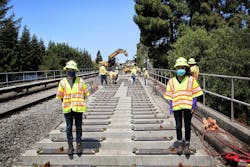BART summer internships give students real-world experience in public transportation
Jennie Nguyen’s summer internship with Bay Area Rapid Transit (BART) let her stretch her computer science skills with real-world experience, architecting a new faregate patron sensor solution and coding the sensors to work in the new faregates
“It definitely gave me experience that I couldn’t get in the classroom alone,” said Nguyen, a senior in computer engineering at the University of California-Santa Cruz.
Nguyen and the other seven students in BART’s engineering internship program recently gave presentations on the projects they worked on during the summer. Nguyen and a fellow intern, Tanner Amador of Arizona State University, tested new sensors for faregates that could help with both accessibility and deterrence of fare evasion.
“We worked with code in Python for the software aspect; for hardware and physical sensors we worked with Raspberry Pi,” Nguyen said.
The two students’ project served as a proof of concept that BART engineers will evaluate further.
“Now I know for sure this is the field that I want to go into,” said Nguyen, who is from San Jose. “BART is a company I can see myself working at in the future. I’d like to work for a company that is doing something about sustainability, which is important to me.”
Wendy Wheeler, BART’s manager of computer science engineering, said Nguyen and Amador’s project has potential for major improvements to BART faregates.
“They’ve written simulation software, tested different placement of sensors, and they’ve gone to meetings to hear from the ADA community, bringing back feedback to incorporate into their designs,” she said. “They did a lot of research.”
Nguyen and Amador’s internships were a combination of work in-person at the BART headquarters, time spent in the field and time working remotely, in light of the COVID-19 pandemic.
The other engineering interns and their projects were: Nam Nguyen, electrical engineering major from UC-Davis, traction power; Xinhe Li, mechanical engineering major from UC-San Diego, predicting insulator failure; Iris Nunez, civil engineering major from UC-Davis, rail grinding; Ann Cherayil, mechanical engineering major from UC-Berkeley, construction management guide; Jonathan Wong, mechanical engineering major from UC-Berkeley, cataloging assets in EGIS; and Emmanuel Dupart, Cal State-Sacramento electrical and electronic engineering, train communications upgrades.
BART General Manager Bob Powers told the engineering interns at their closing presentation that their work will help improve the customer experience.
“I was so impressed with this group,” he said. “Every topic that was talked about was of the utmost importance to BART right now. BART has had a good amount of success with our interns becoming BART employees. I hope you’re in our future.”
BART’s Planning, Development & Construction Department (PD&C) also hosted interns from UCLA, UC San Diego and Berkeley City College. Providing experience in areas of study such as structural and mechanical engineering and urban and regional planning, PD&C intern projects ranged from construction management principles to station planning.
BART has a variety of intern programs across the organization. Besides engineering and planning, there are opportunities for liberal arts students as well, giving them a taste of what it’s like to work in public transportation, and even opportunities for high school students to intern at BART.
This year, due to COVID-19 health orders, BART designed a first-ever virtual internship program, with some students working a hybrid schedule and others working entirely remotely.
Guadalupe Vazquez-Duenas, a senior majoring in history at UC-Berkeley, has learned so much about BART that he’s now on his third internship. This summer, he’s been helping conduct inventories of street parking around BART stations. The previous two summers, he worked in marketing and in procurement, respectively.
“It’s a good opportunity right now to look at parking inventory and occupancy, because the lots are pretty empty right now [due to the pandemic]," he said. “I used a tool called a measuring wheel that counts out the feet as you walk with it. We’re thinking for the future because BART parking lots are going to be full again one day.”
Allison Truong, a junior at UCLA majoring in sociology and communications, interned this summer with the System Safety Department at BART. She worked in the field measuring the distance between station platforms and emergency exits, to verify that BART meet fire safety criteria for the number of minutes required to exit the platform and the station. And she updated a manual that is used by fire departments to understand the emergency exit procedures at BART.
“I had to try to make the engineering jargon clear for first responders who might not be familiar with a particular station,” she said. “It was nice getting to do some work in the field and see what the numbers mean in practice.”
Truong said she’s been a BART rider all her life and could see herself working at the agency in the future.
“With my generation of kids going into the adult world, we tend to look at shiny new things,” she said. “Kids bounce around in jobs for a year or two at a time. But with a government agency like BART, people are here more for the long term.”
Joshua Teo, BART’s manager of Engineer Safety and Truong’s supervisor, said her work on both projects made a meaningful contribution in just a few weeks.
“The fire department manual, it was really old, it was originally created using a typewriter,” Teo said. “Allison helped us to modernize it, with color pages and clearer organization. She was great. She jumped right in.”
District-wide interns also gained valuable work experience in other BART departments such as Human Resources, External Affairs, and Strategic Engineering, completing projects ranging from internal communications and strategy to project planning and program evaluation.
